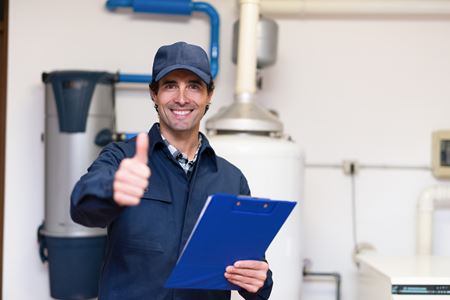Choosing The Perfect Water Heater

Thinking about installing a brand-new water heater for your home? If so, you've got a big choice ahead of you. There are a lot of options out there when it comes to water heaters, so it's good to understand common types of water heaters and their fuel sources before making the big decision.
Type
The two most well-known types of water heaters are conventional reservoir heaters and tankless water heaters. With conventional heaters, the amount of hot water you have on hand at one time is determined by the tank's max capacity. The water stays warm in the insulated reservoir until it's used, after which new water enters the tank and is heated up. Conventional tanks are common and reasonably inexpensive, but they have their drawbacks, too. If your household uses a lot of hot water, the tank can be quickly depleted. Additionally, conventional heaters become less energy-efficient and often deal with heat loss issues as they age.
On the other hand, tankless heaters aren't limited by reservoir capacity, since they don't use one. Instead, water passes through the heater and is instantly heated up using super-heated coils. The biggest benefit of tankless water heaters is that you essentially have unlimited hot water at your disposal. However, on average they're costlier than traditional heaters, and some homes may need additional upgrades for the successful installation of a tankless heater.
Outside of these two popular types, there are three other main types of water heaters:
- Hybrid Heaters/Heat Pumps: These use electricity to pull heat from the ground and the outside air. Popular as an eco-friendly, energy-efficient option.
- Solar Heaters: These generate heat using solar panels and are extremely great at saving you big bucks on energy bills. Of course, there's an obvious drawback: if you get too many cloudy days in a row, there goes your hot water.
- Condensing Water Heaters: These are cost-effective water heaters that run off of the exhaust gas from a home's natural gas heating unit. The trouble with these is that they can only be installed in homes with natural gas.
Since these three water heater types rely on traditionally unconventional energy sources, now's a good time to talk about...
Fuel
The kind of fuel you use can impact what type of heater is ideal for your home. Some certain types of heaters rely on very specific types of energy sources. For instance, condensing heaters use natural gas, solar heaters obviously utilize solar power, and heat pumps primarily work off of geothermal energy, only utilizing electricity to pull heat from the environment.
Outside of types like these which rely on specific energy sources, both traditional and tankless water heaters can work off of electricity, natural gas, propane, and oil. What option you choose depends on how energy-efficient you want to be: electric units are cheaper but less energy-efficient, while heaters that use gas, propane, or oil are far more energy-efficient but costlier upfront.
Installing A New Water Heater
Even if you've got a better idea of what type of water heater you're looking for, it's still important to find a professional plumber to securely install it. If you need a plumber to help you find and install the perfect water heater for your Vacaville property, call Heritage Plumbing at 707-631-1047.